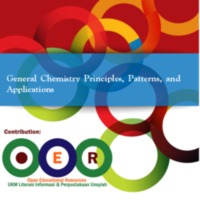General Chemistry Principles, Patterns, and
Applications
Dublin Core
Subject
Description
In this new millenium, as the world faces new and extreme challenges, the importance of acquiring a solid foundation in chemical principles has become increasingly important to understand the challenges that lie ahead. Moreover, as the world becomes more integrated and interdependent, so too do the scientific disciplines. The divisions between fields such as chemistry, physics, biology, environmental sciences, geology, and materials science, among others, have become less clearly defined. The goal of this text is to address the increasing close relationship among various
disciplines and to show the relevance of chemistry to contemporary issues in a pedagogically approachable manner. Because of the enthusiasm of the majority of first-year chemistry students for biologically and medically relevant topics, this text uses an integrated approach that includes explicit discussions of biological and environmental applications of chemistry. Topics relevant to materials science are also introduced to meet the more specific needs of engineering students. To facilitate integration of such material, simple organic structures, nomenclature, and reactions are introduced very early in the text, and both organic and inorganic examples are used wherever possible. This approach emphasizes the distinctions between ionic and covalent bonding, thus enhancing the students’ chance of success in the organic chemistry course that traditionally follows general chemistry.
disciplines and to show the relevance of chemistry to contemporary issues in a pedagogically approachable manner. Because of the enthusiasm of the majority of first-year chemistry students for biologically and medically relevant topics, this text uses an integrated approach that includes explicit discussions of biological and environmental applications of chemistry. Topics relevant to materials science are also introduced to meet the more specific needs of engineering students. To facilitate integration of such material, simple organic structures, nomenclature, and reactions are introduced very early in the text, and both organic and inorganic examples are used wherever possible. This approach emphasizes the distinctions between ionic and covalent bonding, thus enhancing the students’ chance of success in the organic chemistry course that traditionally follows general chemistry.
Source
https://www.saylor.org/site/textbooks/General%20Chemistry%20Principles,%20Patterns,%20and%20Applications.pdf
Publisher
Contributor
Rahmah Agustira
Rights
Creative Commons
Type
Files
Collection
Citation
“General Chemistry Principles, Patterns, and
Applications ,” Open Educational Resources (OER) , accessed March 4, 2026, https://oer.uinsyahada.ac.id/items/show/263.


